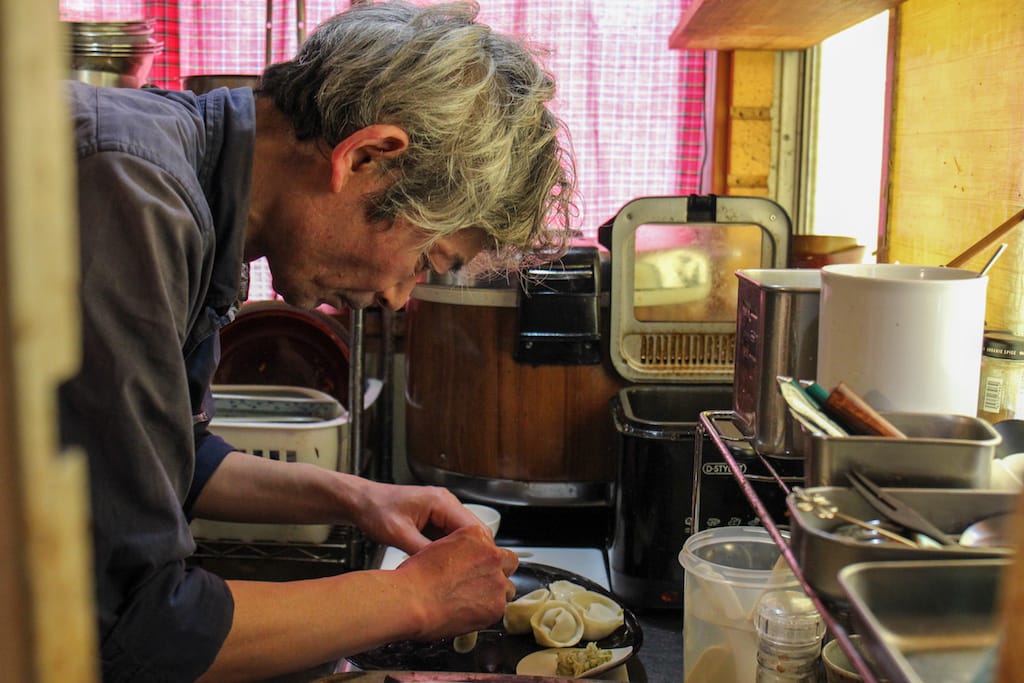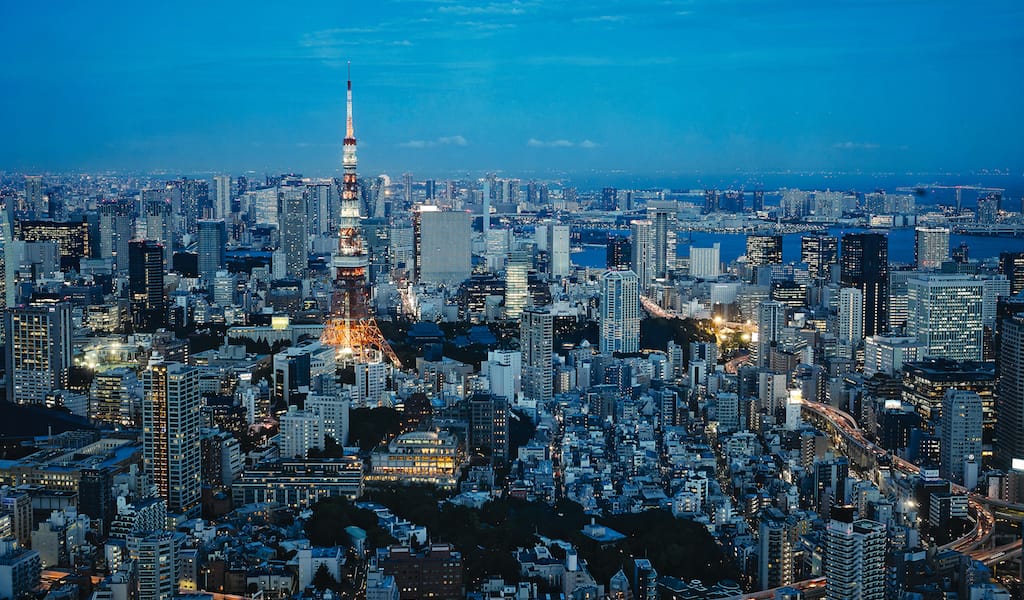Daiji Takada, owner of Chabuzen, peeks out over the counter from the kitchen, which has about a meter-long strip of standing space for one at most. The interior of this narrow restaurant, tucked away in the very fringes of the hip neighborhood of Shimokitazawa in western Tokyo, isn’t much more spacious. Two low tables on tatami provide enough room for around six to squeeze in, and there are a couple of stools at the counter – although occupying those spaces would almost certainly prevent anyone from getting out the door.
With the surety of someone well-used to playing human Tetris, Takada deftly steps out and expertly delivers a plate of gyoza onto the table. He has just made these lovingly by hand and cooked them in a small, plug-in fryer.
These are no ordinary gyoza. The shells are perfectly light and crisp, the dipping sauce peppy and with plenty of sesame, the filling juicy… and meat-free. They are stuffed with soy meat and garlic and somehow avoid that distinct soy taste that alerts the tongue to the absence of meat. In addition to being dangerously tasty, these gyoza are entirely vegan and entirely organic – like every ingredient in the perplexing apothecary of a kitchen.

Nestled in a residential area that makes the 10-minute walk from the nearest station seem unreasonably long, the random, almost defiant nature of Chabuzen’s location bears the classic mark of someone doing exactly what they want, exactly how they want to do it. More than 30 years ago, youthful dreams brought Takada to the area from his hometown of Hiroshima simply, he says, because it seemed like the thing to do. Yet his search for a career didn’t immediately take him into the restaurant business.
“I was a systems engineer,” he says, eyes blinking as if surprised at the words that just escaped his mouth. Indeed, computers were not to be for him. With every operating system update, he struggled to keep up with the pace of change. “I thought to myself what job is it that I can actually do? And I realized it was to make food to heal people.”
A sickly child, he was always concerned about the root cause of his illness. Although he got better as he grew older, he witnessed a number of friends and acquaintances afflicted by various other ailments. Slowly, a connection between health and diet began to solidify in his mind. In 2008, he opened the restaurant with an entirely organic and additive-free menu. It served tonkotsu ramen – and not the meat-substitute kind, but the boil-the-pork-bones-for-hours kind. The definitely not-vegan kind.
However, Takada started getting requests to make the restaurant vegan. As he explains, “In particular, foreigners would find my restaurant on social media and send me requests. Because it was an organic store, it was easy to cater for them.”
In addition to being dangerously tasty, the gyoza are entirely vegan and entirely organic – like every ingredient in the perplexing apothecary of a kitchen.
Some five years ago, Takada converted the menu to completely vegan. “Now I can’t eat meat at all,” he says. “I find it disgusting.” His efforts at working on satisfying dishes have not gone unnoticed. While a small and relatively obscure restaurant in Tokyo’s sprawling mass, those in the know rave about its dragon ramen – a creamy mock tonkotsu that even has people from Fukuoka, the dish’s alleged birthplace, confused as to how it manages to taste so rich without using pork.
“It didn’t actually take me that long to devise the recipe because I already had an idea of what tonkotsu should be like,” Takada says. He added soy milk, soy sauce, miso, mirin (sweet cooking sake), sesame oil and charred garlic to bring the flavor closer to the porky original in a process of experimentation.
But the secret ingredient Takada swears by is something not normally sold on the shelves – brown rice yeast. Genmai – brown (unpolished) rice – is added to water with brown sugar and sea salt and left for a day to produce a yeast solution. It is this liquid – slightly saline and complex on the tongue if drunk straight – that gives the soup its deep flavor. It is also an ingredient advocated by proponents of the macrobiotic diet that originated in Japan in the 1930s, and promotes a pescatarian or vegetarian/vegan diet for various health benefits, although these remain controversial.
Vegetarians and vegans, however, are a minority in Japan, and basic comprehension of what these dietary choices entail is low. Tokyo may have 160,000 dining establishments, but the vast majority offer no vegetarian options, let alone vegan. With inbound tourists on the rise, some restaurants are beginning to catch on, but seeking out vegetarian or vegan specialist stores continues to be the safest strategy, especially for those struggling with the language.
Given this, Chabuzen attracts a broad range of people despite its size and hidden location, and Takada estimates 80% of the customers are now non-Japanese. What started as a personal mission to heal people through diet now draws in vegans with ethical and environmental concerns, as well as Muslims in Tokyo. The restaurant is Halal-certified and the menu is in English, Chinese and Korean.

With his strict ban on additives and organic approach, Takada makes virtually everything from scratch. Each ramen soup has a unique blend of seasonings. For the dragon ramen, he whips out a green bottle of “mayu” – his own unique blend of olive oil, sesame oil, onion, charred garlic and ginger; for the curry ramen, an orange blend of garam masala and turmeric. His “tantanmen” lacks the sesame or Sichuan pepper for which the dish is famed, but is creamy with a deep and satisfying garlic flavor and soft yet lightly spongy chunks of tofu that absorb the broth.
Takada insists it’s neither too difficult or too expensive to source all the organic ingredients he needs. Ramen purists might object, however, as he has abandoned noodles entirely after struggling to find organic versions. Instead, he uses organic Italian spaghetti and soaks it in baking soda to give it a more ramen noodle-like texture. He also offers a fatter variety. “I’ve noticed foreign customers are not accustomed to eating noodles quickly,” he explains. “These ones don’t go soggy as quickly. But the thinner ones are more delicious.”
The menu isn’t limited to noodles and gyoza, with several curries and side dishes also on offer. Particularly decadent is the salty and crisp fried “chicken” topped with spring onions – yet again, it is expertly reworked soy meat, and its texture and flavor would likely fool some carnivores.
The full name of the restaurant in English is “Food Therapy Diner Chabuzen”, but with such addictive delights and hefty portion sizes, it’s easy to leave feeling almost uncomfortably full. Through care and creativity, Takada has created satisfying vegan versions of Japanese soul food. The only concern is whether the restaurant’s growing number of visitors can actually fit inside.
This article was originally published on July 9, 2019.
 July 21, 2021 In Training
July 21, 2021 In Training
Editor’s Note: Although sadly there will be no spectators at this year’s Olympics, set […] Posted in Tokyo July 8, 2019 Cookoomela Grill
July 8, 2019 Cookoomela Grill
In the center of Exarchia, a hub of activism often referred to as the “anarchist” […] Posted in Athens May 3, 2019 CB Book Club
May 3, 2019 CB Book Club
Chef, food writer, and MasterChef champion Tim Anderson shares his love of Tokyo and […] Posted in Tokyo
Published on August 05, 2022
Related stories
July 21, 2021
TokyoEditor’s Note: Although sadly there will be no spectators at this year’s Olympics, set to open July 23, we are running this piece – first commissioned for last summer’s original opening date – in a nod towards Tokyo’s gold medal spirit in the face of what has been a very challenging road to these summer…
July 8, 2019
AthensIn the center of Exarchia, a hub of activism often referred to as the “anarchist” neighborhood of Athens, a small minimalist eatery with just a few tables outside opened last April and was an instant success by breaking all the rules. At first glance it looks like a regular souvlaki shop, with sauces and condiments…
May 3, 2019
Tokyo | By Culinary Backstreets
TokyoChef, food writer, and MasterChef champion Tim Anderson shares his love of Tokyo and Japanese food culture in his new book, Tokyo Stories: A Japanese Cookbook (Hardie Grant, 2019). After moving to London, Anderson, who is originally from Wisconsin, won MasterChef in 2011, a title that catapulted him into a position as one of the…



















































































